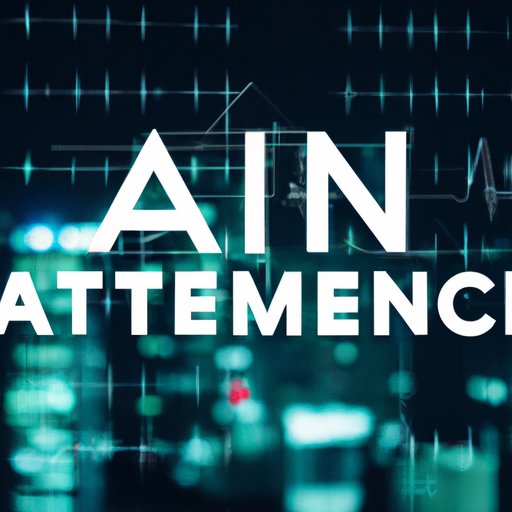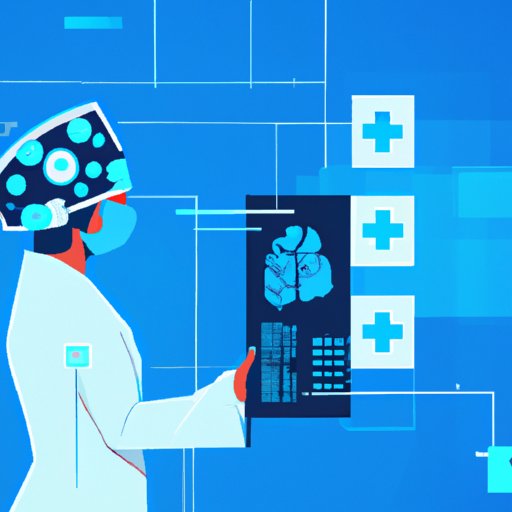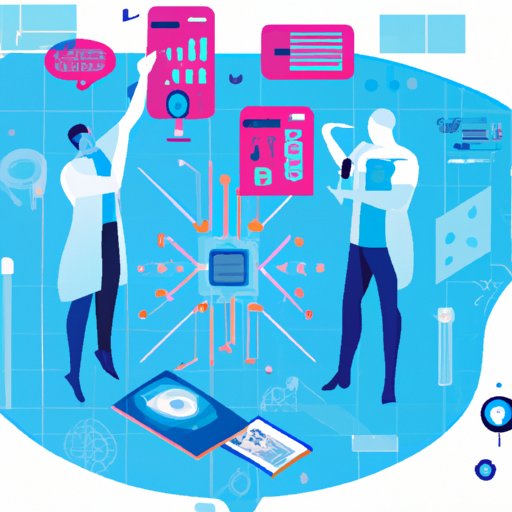Introduction
Artificial intelligence (AI) has become an indispensable tool for many industries. Its ability to process large amounts of data quickly and accurately makes it ideal for a variety of applications, including healthcare. AI is already being used in healthcare to improve diagnosis accuracy, streamline administrative tasks, and provide better patient care.
In this article, we’ll explore how AI is being used in healthcare. We’ll look at the benefits of using AI, as well as examples of applications and systems that are already being implemented. By the end of this article, you will have a better understanding of how AI is transforming healthcare.
Exploring AI-driven Diagnostics and Treatment Options
AI is being used in healthcare to diagnose diseases and develop treatments more accurately and efficiently than ever before. AI-powered systems can analyze vast amounts of data from various sources to identify patterns and anomalies that may indicate a particular disease. This helps to reduce errors in diagnosis and improve accuracy.
AI is also being used to develop treatments and therapies for specific conditions. For example, AI-powered systems can be used to identify potential drug targets and design drugs that are tailored to a patient’s genetic profile. This helps to reduce the time and cost associated with developing new treatments.
AI in Precision Medicine: How It’s Changing the Way We Treat Patients
Precision medicine is a form of medical treatment that takes into account a patient’s individual characteristics such as their genetics, environment, lifestyle, and health history. AI is being used to help physicians make decisions about which treatments might be most effective for a particular patient.
The use of AI in precision medicine offers several benefits. AI-powered systems can analyze a patient’s data and suggest treatments that are tailored to their individual needs. This helps to reduce the risk of complications and side effects, as well as improve the effectiveness of treatments. Additionally, AI can help to reduce costs by helping physicians to identify the most cost-effective treatments for a given patient.
There are a number of examples of AI-powered systems being used in precision medicine. IBM Watson is one such system that uses natural language processing and machine learning to analyze patient data and suggest treatment options. Another example is the Google DeepMind Health project, which uses AI to help doctors diagnose and treat eye diseases.

AI for Patient Monitoring and Care Management
AI-powered systems are also being used to monitor patient health and provide better care management. AI-powered systems can track a patient’s vital signs, detect changes in their condition, and alert medical staff if there is a problem. This helps to ensure that patients receive timely and appropriate care.
AI is also being used to manage patient care. AI-powered systems can analyze a patient’s data and suggest treatments or interventions based on the analysis. This helps to ensure that patients receive the most effective care possible. Additionally, AI can be used to identify trends in patient data, which can help to improve care delivery over time.
Examples of AI-powered systems for patient monitoring and care management include IBM Watson Health and Microsoft Azure IoT Suite. Both of these systems use AI to monitor patient data and suggest interventions when necessary.

Using AI to Streamline Administrative Tasks in Healthcare
AI is also being used to streamline administrative tasks in healthcare. AI-powered systems can automate mundane tasks such as scheduling appointments, filling out forms, and managing billing. This helps to reduce costs and free up staff to focus on providing better patient care.
There are a number of examples of AI-powered systems being used to streamline administrative tasks in healthcare. Microsoft Dynamics 365 is one such system that uses AI to automate administrative tasks such as appointment scheduling and billing. Another example is the Mayo Clinic’s AI-powered system for managing patient records.
AI for Clinical Decision Support in Healthcare
AI is also being used to provide clinical decision support in healthcare. AI-powered systems can analyze patient data and suggest treatment options based on the analysis. This helps to reduce errors and improve the accuracy of medical decisions.
Examples of AI-powered systems for providing clinical decision support include IBM Watson Health and Medtronic’s AI-enabled medical devices. These systems use AI to analyze patient data and suggest treatment options based on the analysis.
Conclusion
AI is transforming the healthcare industry in a number of ways. It is being used to diagnose diseases, develop treatments, provide precision medicine, monitor patient health, manage care, streamline administrative tasks, and provide clinical decision support. The use of AI in healthcare offers a number of benefits, including improved accuracy and reduced costs.
It is clear that AI is revolutionizing the way healthcare is delivered. As AI technology continues to improve, it is likely that its use in healthcare will only increase. For those interested in exploring AI in greater detail, there are a number of resources available online.
(Note: Is this article not meeting your expectations? Do you have knowledge or insights to share? Unlock new opportunities and expand your reach by joining our authors team. Click Registration to join us and share your expertise with our readers.)
